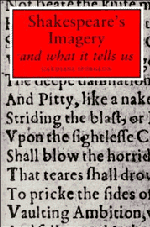Book contents
- Frontmatter
- ACKNOWLEDGEMENTS
- PREFACE
- Contents
- ILLUSTRATIONS
- Part I THE REVELATION OF THE MAN
- I The Aim and Method explained
- II Shakespeare's Imagery compared with that of Marlowe and Bacon
- III Imagery of Shakespeare and other Dramatists compared
- IV The Subject-matter of Shakespeare's Images
- V Shakespeare's Senses
- VI Shakespeare's Tastes and Interests
- VII Shakespeare's Tastes and Interests (continued)
- VIII Evidence in the Images of Shakespeare's Thought
- IX Evidence in the Images of Shakespeare's Thought (continued)
- X Association of Ideas
- XI Shakespeare the Man
- Part II THE FUNCTION OF THE IMAGERY AS BACKGROUND AND UNDERTONE IN SHAKESPEARE'S ART
- APPENDICES
- INDEX
- CHARTS
X - Association of Ideas
Published online by Cambridge University Press: 20 February 2010
- Frontmatter
- ACKNOWLEDGEMENTS
- PREFACE
- Contents
- ILLUSTRATIONS
- Part I THE REVELATION OF THE MAN
- I The Aim and Method explained
- II Shakespeare's Imagery compared with that of Marlowe and Bacon
- III Imagery of Shakespeare and other Dramatists compared
- IV The Subject-matter of Shakespeare's Images
- V Shakespeare's Senses
- VI Shakespeare's Tastes and Interests
- VII Shakespeare's Tastes and Interests (continued)
- VIII Evidence in the Images of Shakespeare's Thought
- IX Evidence in the Images of Shakespeare's Thought (continued)
- X Association of Ideas
- XI Shakespeare the Man
- Part II THE FUNCTION OF THE IMAGERY AS BACKGROUND AND UNDERTONE IN SHAKESPEARE'S ART
- APPENDICES
- INDEX
- CHARTS
Summary
Shakespeare's tendency to have a similar group of ideas called up by some one single word or idea is a very marked feature of his thought and imagination. He must have been perfectly aware of this tendency himself, and in the person of Salarino, he describes very accurately how inevitably such association works in the mind.
My wind, cooling my broth,
Would blow me to an ague, when I thought
What harm a wind too great at sea might do.
I should not see the sandy hour-glass run,
But I should think of shallows and of flats,
And see my wealthy Andrew dock'd in sand.
…Should I go to church
And see the holy edifice of stone,
And not bethink me straight of dangerous rocks,
Which touching but my gentle vessel's side
Would scatter all her spices on the stream.‥
It is very interesting to trace these groups, and to note, for instance, in his early and late work, how his art develops and gains strength and freedom in the expression of them.
In this connection the two poems are full of material, full of the embryos, as it were, of thoughts, views, images, and clusters of ideas which later we find worked out in fuller detail in the plays. Thus, these lines in Lucrece,
Let him have time a beggar's orts to crave,
And time to see one that by alms doth live
Disdain to him disdained scraps to give,
show exactly the same group of ideas which later are brought together again in the somewhat curious but very vivid personification of time in Ulysses' great speech in Troilus and Cressida.
- Type
- Chapter
- Information
- Shakespeare's Imagery and What it Tells Us , pp. 186 - 199Publisher: Cambridge University PressPrint publication year: 1935



